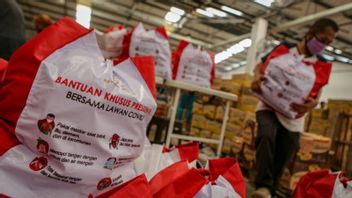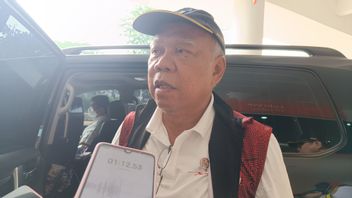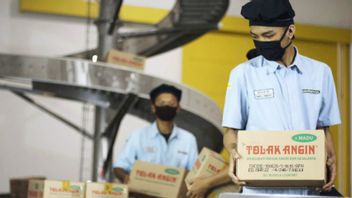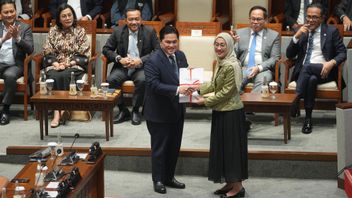
JAKARTA - Inflation in January 2025 was recorded at 0.76 percent (yoy), lower than inflation in December 2024 was recorded at 1.57 percent (yoy).
Coordinating Minister for Economic Affairs Airlangga Hartarto said this achievement reflected the effectiveness of the synergy of government policies in maintaining price stability amid increasing core inflation and controlling volatile food inflation (VF), as well as reducing administrative price inflation (AP).
According to Airlangga, this is the result of the consistency of monetary policy, fiscal policy and synergy in controlling inflation, both at the central and regional levels, through the Central and Regional Inflation Control Team (TPIP and TPID).
"controlled inflation is expected to keep economic growth strong," he said in his statement, Tuesday, February 4.
Meanwhile, core inflation continued to increase in January 2025 by 0.30 percent (mtm) or 2.36 percent (yoy) where gold jewelery and powder coffee are still the main contributors to core inflation because global gold prices are still fluctuating in the midst of ongoing geopolitical conflicts and increasing domestic powder coffee prices.
Meanwhile, inflation in volatile food (VF) in January 2025 was recorded at 2.95 percent (mtm) and 3.07 percent (yoy).
Airlangga conveyed that this achievement was in accordance with the results of the High Level Meeting of the Central Inflation Control Team (HLM TPIP) which was held on January 31, 2025, that volatile price inflation was maintained in the range of 3 percent to 5 percent.
Some commodities that experienced a monthly price increase in January include red chilies, cayenne pepper, fresh fish, chicken meat, and rice.
Meanwhile, the price component regulated by the Government or administrative price (AP) experienced deflation of 7.38 percent (mtm) or 6.41 percent (yoy).
The occurrence of deflation in the AP component was mainly caused by electricity tariffs, air transportation rates and train fares.
The reduction in electricity rates is in line with the Government's policy of providing a 50 percent discount on electricity rates to household customers with a power of 450 VA 2,200 VA which is valid during January-February 2025.
Throughout January 2025, electricity tariffs experienced deflation of 32.03 percent (mtm) and a contribution of 1.47 percent deflation.
Airlangga said the Government had issued various Economic Stimulus Packages in the context of the National Religious Holidays (HBKN) for Christmas and New Year 2024/2025 to increase people's purchasing power at the end of the year.
One of these stimuli is the provision of more affordable aircraft ticket rates to support the expansion and improvement of the national tourism sector.
"The government provides discounts of up to 10 percent on aircraft tickets during the period 19 December 2024 to 3 January 2025 at all airports in Indonesia. This policy contributes 0.01 percent to the deflation of air transportation," he explained.
On the other hand, commodities that hold back the AP inflation rate are gasoline, with a share of 0.03 percent. The increase in gasoline prices was influenced by the adjustment of non-subsidized fuel prices in January 2025, which included the types of Pertamax, Pertamax Turbo, Dexlite and Pertamina Dex with an increase of between 1 percent and 4 percent.
Furthermore, in the manufacturing sector, the Indonesian Manufacturing Purchasing Managers' Index (PMI) showed an impressive performance, which was maintained at an expansive level and even increased to 51.9 in January 2025 from the previous 51.2 level in December 2024.
According to him, this level was achieved amid a decline in the majority of PMI Manufacturing in Southeast Asia such as Myanmar, Vietnam, the Philippines, and Thailand which at the same time pushed for a slight decline in the ASEAN Manufacturing PMI.
Airlangga conveyed that the stability of market and economic demand as a whole, especially domestically indicated as a driving factor for this success.
"It is noted that the company surveyed said that there was an increase in orders and encouraged the company to increase its production so that it became the highest in the last three months," he said.
In addition, Airlangga said that this increase in production was also a turning point for companies to increase labor.
In this case, the pace of increasing labor in January 2025 was the highest in the last two years, as a step in meeting demand.
"Various companies are optimistic about the condition of demand in the manufacturing sector in the next year," he explained.
Airlangga said that various efforts from the Government were also intensified in supporting the manufacturing sector, such as prioritizing the use of local raw materials, providing fiscal incentives, and protecting domestic industries.
According to him, to reduce the impact of weakening the Rupiah exchange rate, especially on price pressure, the Government encourages the use of local raw materials through the acceleration of downstreaming of natural resources-based industries.
In addition, Airlangga said the government provides VAT DTP incentives for the automotive sector, as well as financing for labor-intensive sectors such as finished clothing, textiles, and furniture to increase productivity with interest subsidy schemes.
"The government also strengthens protection against domestic industries through safeguards and anti dumping policies, as well as seeks to increase market access to Indonesian export products," he said.
SEE ALSO:
Through international trade cooperation, Airlangga said the government was preparing Indonesia to join the CP-TPP agreement and accelerate the Indonesia-EU CEPA negotiations to expand the penetration of Indonesian products in the Latin American and European Union markets.
"Price stability, availability of sufficient food commodities, and support for priority sectors continue to be the government's concern," he explained.
Airlangga said that controlling commodity prices accompanied by a maintained PMI level at an expansive level is a separate achievement that encourages world optimism towards Indonesia.
"The synergy between the government, Bank Indonesia, and the community is an important point in realizing a strong and inclusive economy," he concluded.
The English, Chinese, Japanese, Arabic, and French versions are automatically generated by the AI. So there may still be inaccuracies in translating, please always see Indonesian as our main language. (system supported by DigitalSiber.id)















